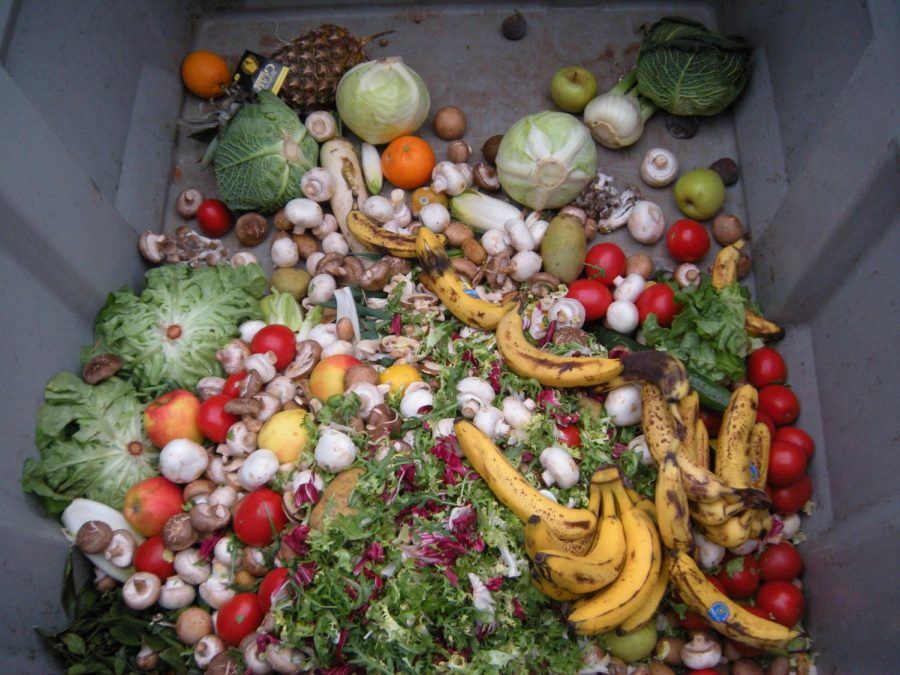Dawe: Relying on individuals to save the world is unsustainable and unfair
Many grocery stores throw out edible food that may not look appealing to customers.
October 8, 2020
In recent years it has become a trend to encourage individuals to do their part for various causes, especially in regards to the environment, despite the fact that these issues are so ingrained into our society that they cannot be fixed by individual action alone. This is an excellent way for powerful corporations to delegate the task of making moral decisions to the consumers, instead of making environmentally safe, sustainable products themselves.
A common childhood experience represents this problem perfectly. Most children are forced to eat all of the food on their plate before they can leave the dinner table. And if they happen to waste some food, an adult may use the common line “There are starving children in Africa.” However, each year, the United States throws away one-third of all the food that it produces.
Supermarkets throw away 10% of all food produced. Most of this is perfectly good food that simply gets thrown away due to the standard grocery store business model. Overstocked produce displays, which encourage consumers to buy more produce, end up damaging the produce on the bottom. Consumers also expect perfect produce, which encourages supermarkets to throw away perfectly tasty but less visually appealing produce.
Most importantly, sell-by dates do not indicate the product’s freshness. They indicate peak freshness, so they should be sold by the date, but, most of the time, they are still perfectly acceptable to eat. As children, we are taught to be shameful of food waste despite the fact that thousands of pounds of food are thrown away every year by large companies because it isn’t pretty or has “expired.” It is important to hold grocery stores responsible for their actions, instead of punishing children for adding a drop of water into an ocean.
This phenomenon happens a lot within environmental activism. While, yes, it is important to make more environmentally sustainable decisions, just 100 companies are responsible for 71% of all carbon emissions. Even worse, 20 of these companies are responsible for one-third of greenhouse gas emissions in the entire modern era. These corporations have the key to saving the planet and yet they do nothing in favor of their own profit over the planet.
The worst offenders? Chevron, Exxon, British Petroleum and Shell are behind 10% of all carbon emissions since 1965. In 1965, 55 years ago, global fossil fuel industry leaders and politicians knew the effect that fossil fuels had on the environment. Despite the companies’ claims that they are actually trying to delay the climate crisis by responsibly using their oil and gas, a study found that these top oil and gas firms actually, surprise surprise, spend millions lobbying against climate change policies.
Incorporating sustainable decisions into our everyday life is still important. While a single person won’t do a lot, repeatedly using sustainable products creates a demand for these products, which can allow them to be available to more people. However, it is important to remember that if we mess up trying to live a sustainable life, it is not that big of a deal. The fate of the environment does not rest on a single person’s shoulders, and the idea that it does is extremely toxic. Responsibility for fixing the environment should be forced onto the companies that are destroying it instead of everyday consumers.
It is a toxic idea that the responsibility of the world rests on one person’s shoulders. Yes, please try to be more sustainable, but it is fine if that’s not possible. Corporations are going to do way more damage to the environment than a single person will ever do. Holding the real problem-causers accountable for their actions will do way more to fix problems. It is important to still try to make productive changes in our lives, but it is okay to fail. No single person will save the environment by being vegan or plastic-free. Do activism imperfectly because we are not that much of the problem. We are part of the solution.









